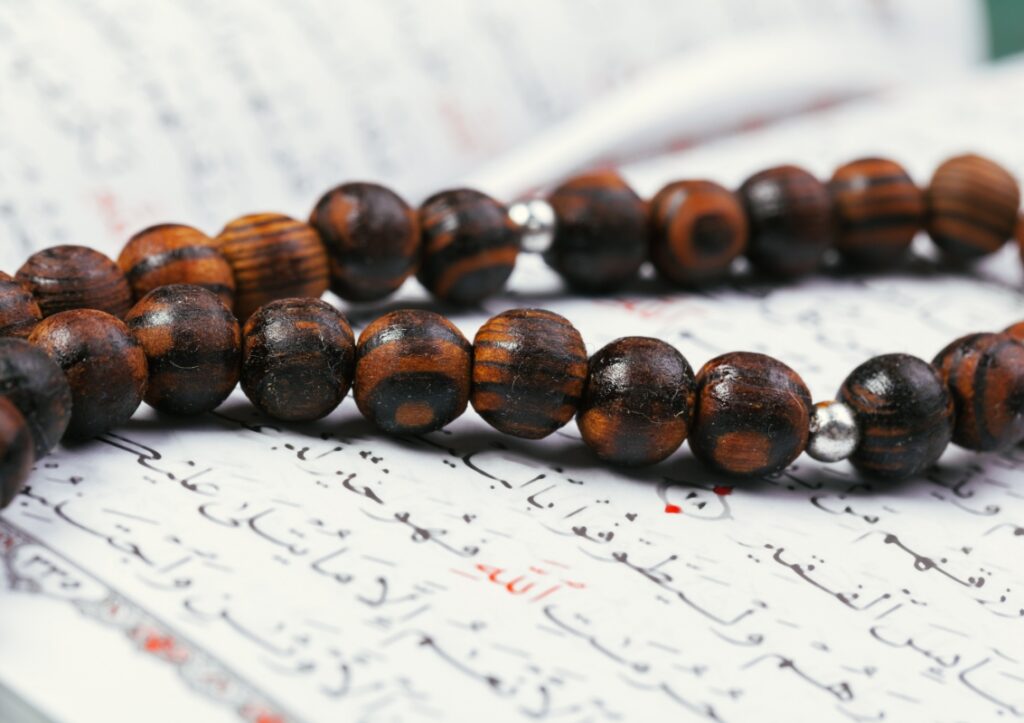After completing the month of Ramadan, the day of Eid al-Fitr marks a new beginning in which the believer is free of all sins. He reverts to his previous state, clean and blemish-free.
After Ramadan, Muslims celebrate Eid al Fitr with their relatives and friends. The “farewell to fasting” is Eid al Fitr, also known as Meethi Eid.
This day represents the completion of Ramadan, a month during which many Muslims refrain from eating or drinking from sunrise until sunset. We’ll learn What Does The Quran Say About Eid ul Fitr.
What Eid is after Ramadan?
Eid al-Fitr (Arabic: عيد الفِطر ) is a major holy holiday in Islamic tradition that commemorates the conclusion of Ramadan.
Fitr means “opening,” and as this date (Shawwal 1) marks the end of a month of fasting for Muslims, it is known as Eid al-Fitr.
The significance of this day is mentioned in some passages and hadiths. On this day, Muslims refrain from fasting and hold Eid prayers.
Muslims are required to pay Zakat al-Fitr on this day. In Islamic countries, official holidays frequently follow this day.
The term “Fitr” literally means “opening (of anything).” The following verse’s term “Infatarat” (Arabic: إنفَطَرَت) is derived from the same root as the word “Fitr”:
“When the sky is torn to pieces,” (Quran 82:1)
It is also said that “Tatafattarat” (Arabic:تَفَطَّرَت ) and “Infatarat” (Arabic: ) have the very same sense, and “Iftar” (Arabic:إِفطار ) and “Fitr” (Arabic: فِطر) are derived from the same origin, because a fasted person opens his mouth to eat at dusk and on the day of Eid.
What Quran says about Eid ul Fitr?
Allah, according to the Quran, says,
“O you who believe, fasting is required for you, as it was recommended for those who came before you, in order for you to achieve God-consciousness.” (Quran 2:183).
It is a day when Muslims thank Allah for all of His favors. Humans would not be able to gain connection to Him and happiness in both worlds without it.
Quran Verses about Eid ul Fitr
The Almighty Lord says in the Holy Quran’s chapter 2, verse 185:
“You shall finish the number [of days] so that you may praise God for guiding you and be grateful.”
“Festival of Breaking the Fast” is the way that how Eid al Fitr is translated.
How does Prophet Muhammad describe the festival of Eid ul Fitr?
Our Eid-al-Fitr programme involves giving gifts to youngsters who are in need. The giving of presents, known as Eidi or Eidiya, is another popular Eid-al-Fitr custom.
“Give gifts to one another, and you will love one another,” the Prophet Muhammad (peace be upon him) recommended (Hadith, Al Mufrad).
Eating Different Types of Foods
Preparing and enjoying various meals, particularly sweets, also symbolises the auspicious day of Eid.
It is related by Hazrat Anas (RA) that:
“On the days of Eid-ul-Fitr, the Prophet (PBUH) did not go (to the place of Salah) until he had eaten some dates, and he used to consume an odd number.” (Bukhari)
As a result, Muslims should eat some sweets before heading outdoors to worship. Because of this Sunnah of the Holy Prophet, this Eid is also known as “Meethi Eid” (PBUH).
Using Different Routes
On Eid, Hazrat Mohammed (PBUH) takes a different route; the road he took to the Mosque for prayer must be distinct from the path he takes back. The reason for this Sunnah is that he basically wanted to meet more people so that he could welcome them with “Eid Mubarak” and spread love and greetings.
The following is recounted by Hazrat Jabir (RA):
“On the day of Eid, the Holy Prophet (PBUH) used to take a different path back than when he went out.” (Bukhari)
As a result, the primary goal is to spread love and fraternity to as many people as possible. As a result, one of the secrets to doing this act of generosity is to change your path.
Thus, Eid is a gift from God, and we should all enjoy it with fervour and enthusiasm, while also remembering the impoverished people who are left behind.
On Eid day, we should do our best to meet as many people as possible, because one of the reasons of Eid is to hug those who have been far from us throughout the year.
Eid is the greatest benefit for all Muslims, since it is a time for them to get together and celebrate.
What is the Arabic word for Eid Mubarak?
Eid Mubarak, or (Arabic: مبارك عيد ), is an Arabic phrase that literally means “blessed feast/festival.” Arab Muslims, and also Muslims all around the world, use the phrase.
Offer Eid Prayers
The Eid prayer is the most well-known of Prophet Muhammad’s (PBUH) acts related to Eid-ul-Fitr. Muslims begin this blessed day with a prayer to God.
It is said of Hazrat Jabir bin Samurah:
“I prayed the two Eid prayers with Allah’s Messenger more than once or twice, without an Adhan or Iqamah.” (Muslim)
The above-mentioned narrative clearly shows that Eid Prayer is a particular action done by Prophet Muhammad (PBUH) on the day of Eid-ul-Fitr.
Eid al-Fitr: Its Importance
Muslims commemorate the completion of their sacred responsibilities throughout Ramadan with the start of Eid al-Fitr, or the Festival of Breaking the Fast, after a month of prayer, dedication, and self-control.
In many Muslim-majority nations, the festival is observed as a national holiday. Eid al-Fitr celebrations normally last three days, one day less than Eid al-Adha celebrations.
As a result, Eid al-Fitr is commonly referred to as “Lesser Eid” or “Smaller Eid.” Eid al-Adha, sometimes known as “Greater Eid,” is the more important of the two holidays.
Muslims participate in special prayer time during Eid al-Fitr, meet each other with traditional embraces, and exchange pleasantries of “Eid Mubarak,” or “Have a blessed Eid.”
They get together with family and friends, play games and present gifts to the kids, and cook and eat special meals, especially sweets.
The following are some examples of sweet foods from various countries:
- Baklava Pasteries or Turkish delight in Turkey
- Date-filled pastries and cookies in Saudi Arabia
- Iraq, and Yemen’s Bint al Sahn (a type of cake that is purely made of honey).
Zakat, or almsgiving to people in need, is another of Islam’s five pillars. Muslims often donate money to charity in the run-up to Eid al-Fitr so that less privileged families can partake in the celebrations as well.
Muslims are advised to donate and ask forgiveness during Eid al-Fitr, in addition to charity, and to hope to have the opportunity to fast again during Ramadan the next year.
Comparison Between Eid al-Fitr and Eid al-Adha
Eid al-Adha, the Islamic calendar’s second major holiday, falls after the conclusion of the Hajj, the yearly journey of millions of Muslims to the holy city of Mecca in Saudi Arabia.
The Prophet Abraham (Ibrahim) was eager to sacrifice his son to God (Allah), according to the Quran, but God accepted an animal sacrifice instead.
The Feast of the Sacrifice, also known as Eid al-Adha, commemorates Abraham’s willingness to sacrifice his son for Allah.
The holiday’s celebrations normally span four days and are equal to those of Eid al-Fitr, with the exception that Muslims enjoying Eid al-Adha traditionally sacrifice an animal for meat.
After that, the meat is divided among family and friends, with a major percentage being given away to poor and needy people.
Eid al-Fitr: Day of Faith
Doing ghusl, which can be done after Fajr, is one of the highly recommended deeds of Eid al-Fitr day, however, there is some debate on whether the time of Zuhr prayer or the sunset is the latest time it can be done.
In the Age of Occultation, Eid prayer is advised, but it is required in the presence of Imams (a). Before the Eid al-Fitr prayer, it is suggested that you eat something, preferably dates.
After Maghrib prayer on the eve of Eid, as well as in the Fajr prayer in the morning of Eid and in the Eid prayer, it is suggested to say Takbirs as prescribed.
Fasting is prohibited on the day of Eid al-Fitr. The Nudba supplication should be recited, as well as the family’s dietary habits should be expanded.
Traveling on Eid day after sunrise and before conducting the Eid prayer (if required) is prohibited; otherwise, it is objectionable.
Receiving Reward of the Worship of the Month
Eid is a day when the blessings of the month’s worship are given.
According to Imam Ali (a),
O Allah’s servants! The minimal recompense for those who fasted during Ramadan is an angel who, on the last day of the month, calls out to them, saying, “O servants of Allah! Rejoice in the fact that you have been forgiven of all your previous transgressions.” (P.564, Rawdatul W’zn)
Get Togetherness and Unity
A day when Muslims come together and line up to say their Eid salat. They have all worshipped and kept fasted during the Holy Month.
They are united in their praise and appreciation to Allah. It’s a day for community members to rekindle and enhance their relationships.
A Reminder of the Day of Judgment
The day of Eid, according to Imam Ali (a), serves as a reminder of the Day of Judgment. He declares:
Oh, you people! This is, without a doubt, the day when the upright are rewarded and the terrible are punished. It is a day that will be similar to the day when you will stand before your Lord.
As a result, whenever you leave your houses to travel to places of prayer, remind yourself of the day when your souls will leave your bodies to return to your Lord.
Remind yourself that you are standing in the presence of your Lord when you stand on areas where you pray (on the Day of Judgment). And as you return home after prayer, remember that you will be returning to your houses in Paradise. (Ibid)
A Holiday Celebrating Eid al-Fitr
In various Arab and non-Arab countries, Eid al-Fitr is one of the most major Eids, with a two- to twelve-day holiday.
The closure of schools, colleges, universities, banks, government institutions, and all private organizations can be observed these days.
How should Muslims celebrate Eid al Fitr according to Islam?
Muslims are invited to gather with their relatives and friends to enjoy Eid al Fitr. They should come together for a celebratory supper and exchange gifts.
Eid al Fitr does not have a set date, but Muslims are advised to celebrate on the first day of the following month.
Another essential practice is that three days after Eid, Muslims should not fast.
Frequently Ask Questions
1. Does the Quran mention word “Eid”?
The term “Eid” appears only once in the Quran’s fifth sura, Al-Ma’ida, with the meaning “solemn festival (holiday).”
2. What is the purpose of Allah giving us Eid?
The celebration serves as a reminder of Allah’s bounty and demonstrates the need of submission to Allah.
Muslims commemorate the Prophet Ibrahim’s (Abraham’s) hardships when he was called to make a huge sacrifice for the sake of Allah during Hajj.
3. Does Eid Salah Fard on Muslims or it is a Nafli ibadat?
The Eid prayer is not fard. It’s called wajib when we say Allah o Akbar with Takabeer. It’s similar to Nafl. The major purpose of the Eid prayer is to express gratitude to Allah SWT for providing us with the month of Ramadan, during which we prayed, fasted, and attempted to fulfill all Islamic requirements that we had not been able to accomplish previously.
4. Does“Eid Prayer” a Religious Celebration?
Yes! Eid prayer is a religious celebration that allows us to reconnect with individuals we haven’t seen in a while and renew our bonds.



